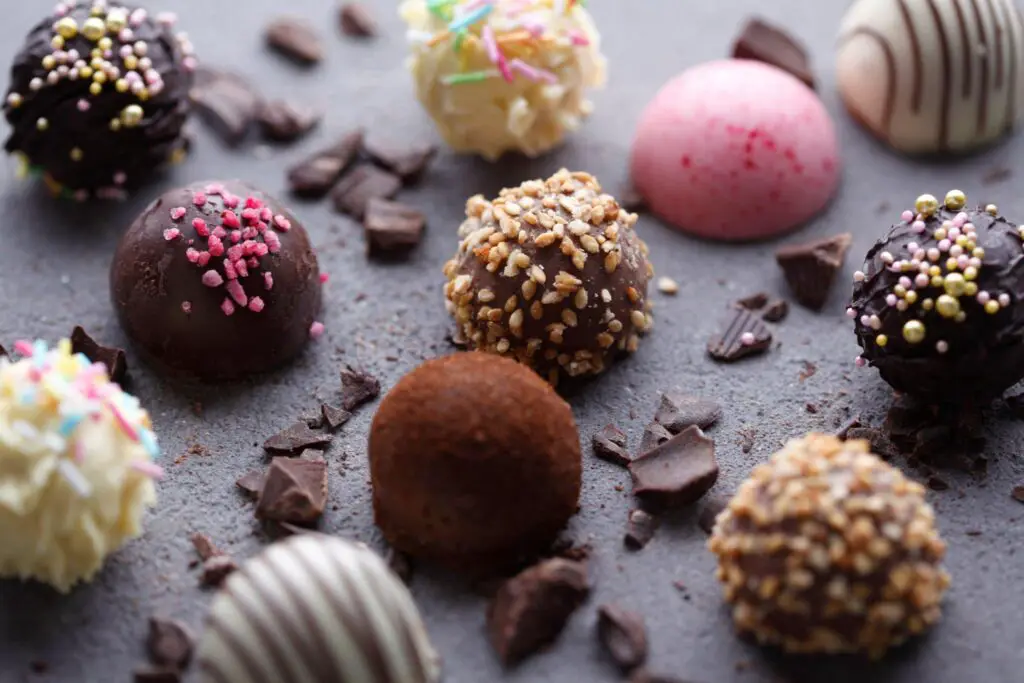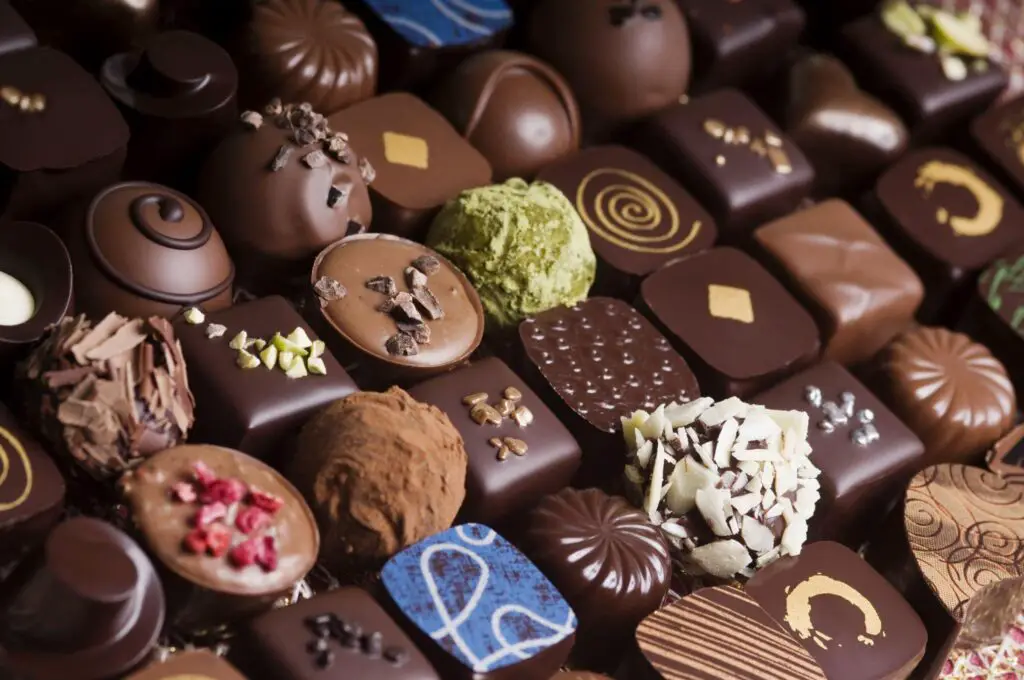For many people, a day without chocolate is almost unimaginable. From milk chocolate to dark, it comes in many forms and can be used in countless recipes. But have you ever wondered does chocolate have caffeine?
It’s a question many have asked, and the answer might surprise you. In this blog post, we will dive deep into the world of chocolate and uncover the truth behind this commonly-held myth. So grab a piece of your favorite sweet treat, and let’s get started!
The History Of Chocolate And Caffeine

The history of chocolate and caffeine is fascinating, dating back to ancient Mesoamerica. The Olmecs and later the Maya believed that cacao was a divine gift from the gods and enjoyed its caffeinated kick in spiced chocolate beverages. The Europeans also quickly became enamored with chocolate, tea, and coffee, consuming them widely in nineteenth-century Europe for their appealing taste and numerous benefits.
The invention of the cocoa press by Dutch chemist Coenraad Johannes van Houten in 1828 revolutionized the chocolate industry, allowing for the first chocolate bar. Today, important components in chocolate include flavonoids, cocoa butter, caffeine, theobromine, and phenylethylamine.
Despite the different paths that brought chocolate and caffeine to the forefront of human consumption, people worldwide continue to enjoy them in their various forms.
Does Chocolate Have Caffeine?
It is a known fact that chocolate contains caffeine, but the amount of caffeine present in chocolate can vary depending on the type of chocolate. For example, white chocolate, which contains only cocoa butter and no cocoa solids, has zero caffeine, while dark chocolate has the highest amount of caffeine among all chocolate varieties.
A 3.5-ounce bar of 70 to 80 percent dark chocolate has about 70 milligrams of caffeine but can contain as much as 85 milligrams. Milk chocolate, on the other hand, contains only around 7 milligrams of caffeine per serving. However, chocolate’s caffeine content is relatively small compared to other foods or drinks containing caffeine.
So, while consuming chocolate may provide a little boost of energy due to the caffeine content, it is not a significant contributor to one’s daily caffeine intake.
Read more:
- How Much Caffeine is in a Latte? An Overview of the Popular Coffee Beverage
- How Much Caffeine Is in Mcdonald’s Iced Coffee?
- Does Squirt Have Caffeine? Find Out Here
- Dunkin Refreshers: Do Dunkin Refreshers Have Caffeine?
- Does Acai Have Caffeine? The Surprising Answer
- Myth Busted: Does Chocolate Have Caffeine?
Scientific Studies On The Presence Of Caffeine In Chocolate
Scientific studies on the presence of caffeine in chocolate have shown that moderate caffeine consumption from natural sources is safe. While some chocolates may contain caffeine or its close relative, theobromine, the levels vary greatly depending on factors such as the cocoa mass content.
Researchers have developed new analytical methods using HPTLC and other detection methods, such as HPLC and GC-MS, to determine the caffeine content in chocolates. It has been discovered that some people may have a genetic variant that contributes to their ability to enjoy multiple cups of coffee or a higher caffeine intake from chocolate. While more research needs to be done on how much caffeine is in chocolate, consuming it in moderation may benefit cognitive function and mood.
Overall, the scientific evidence suggests that the presence of caffeine in chocolate is not a cause for concern but rather an interesting aspect of its composition.
The Common Misconception That Chocolate Has Caffeine
There is a common misconception that chocolate is a significant source of caffeine. However, the truth is that while chocolate does contain caffeine, the amount is relatively small. Tea and coffee are actually richer sources of caffeine than chocolate.
Therefore, it may not be accurate to consider chocolate a stimulant. One would have to eat a considerable amount of chocolate to get a jolt, and it’s unlikely that one would feel a significant effect from the caffeine present in chocolate.
So, while chocolate may have a small amount of caffeine, it’s not as much as many people believe it to be.
The Truth About Caffeine And Chocolate
The truth is complicated when it comes to chocolate’s caffeine content. While chocolate does contain caffeine, it usually has much less than coffee or tea. However, the amount of caffeine varies depending on the type of chocolate and how much cocoa is present.
Dark chocolate, in particular, contains more theobromine than caffeine, which can also stimulate the nervous system. It’s important to note that the impact of consuming caffeine in chocolate varies from person to person. Regular coffee drinkers may not feel the effects as strongly, while those more sensitive to caffeine may want to limit their intake.
Ultimately, enjoying chocolate in moderation can be a delicious way to experience a small energy boost.
The Actual Caffeine Content In Chocolate Versus Coffee

It’s common knowledge that coffee is a major source of caffeine, but did you know that chocolate contains caffeine too? While the amount of caffeine in chocolate is lower than in coffee, it’s still significant enough to impact your body.
On average, an 8-ounce cup of brewed coffee contains around 95 milligrams of caffeine, while a 1-ounce serving of dark chocolate contains approximately 24 milligrams. However, it’s important to note that not all chocolate is the same – the darker the chocolate, the higher the caffeine content. Milk chocolate, in contrast, contains very little caffeine.
So if you’re looking for a treat that will give you a caffeine boost, a cup of coffee is definitely your go-to, but if you’re after a milder caffeine fix, a square of dark chocolate could be just what you need.
Other Energy-boosting Compounds In Chocolate Excluding Caffeine
Chocolate also contains other energy-boosting compounds that enhance cognitive abilities and physical performance. One such compound is theobromine, naturally found in cacao and dark chocolates. Theobromine provides a consistent energy level without the spikes and crashes associated with coffee. It is also known to have neuroprotective effects, helping to prevent age-related cognitive decline.
Another compound found in chocolate is anandamide, which has mood-boosting and energy-boosting effects without the addictiveness and cardiovascular damage associated with other stimulants. Additionally, flavonoids present in chocolate can increase blood flow to the brain and improve mental clarity.
Together, these compounds make chocolate a potential sustainable energy source for those seeking an alternative to the caffeine crash.
Tips For Enjoying Chocolate Without Disrupting Your Sleep
- Choose dark chocolate over milk chocolate. Dark chocolate has lower sugar levels and higher amounts of antioxidants, making it a healthier choice.
- Avoid consuming chocolate before bedtime. The National Sleep Foundation recommends avoiding chocolate within three hours of bedtime to give your body adequate time to digest.
- Moderation is key. Eating too much chocolate, even dark chocolate, can lead to heart palpitations and insomnia. Enjoy in moderation.
- Drink water or milk with your chocolate. Consuming a cup of water or milk containing some 100% pure cocoa or chocolate teaspoons might help you cope better with stress without disrupting your sleep.
- Opt for hot cocoa instead of chocolate bars. Hot cocoa, dissolved in milk, is regarded as a sleep-promoting drink. Plus, it’s a tasty alternative to consuming chocolate bars.
- Pay attention to your caffeine tolerance. Chocolate contains caffeine and theobromine, making your heart race and disrupt your sleep, especially for sensitive sleepers. Be mindful of caffeine tolerance, and avoid consuming chocolate close to bedtime.
- Enjoy chocolate earlier in the day. If you’re craving chocolate, consuming it earlier in the day instead of later at night is best. This gives your body enough time to digest it before bedtime.
- Lastly, listen to your body. Everyone’s body reacts differently to chocolate, so listening to your own is important. If chocolate disrupts your sleep, it’s best to avoid it altogether.
In conclusion, chocolate can be enjoyed without disrupting your sleep if you practice moderation, avoid consuming too close to bedtime, and pay attention to caffeine tolerance. Drinking water or milk with your chocolate helps you cope better with stress. Happy snacking!
Chocolate May Not Have Caffeine, But It Still Has Its Perks!
Chocolate lovers rejoice! While white chocolate may not contain any caffeine, all types of chocolate have unique benefits that make them worth indulging in. Small studies have shown that cocoa, an ingredient in chocolate, may benefit heart health thanks to certain nutrients.
Dark chocolate, which has a higher percentage of cacao, is more caffeinated than other chocolates. Still, it is also packed with important minerals, can enhance mood, and is rich in theobromine, which provides a relaxed focus.
So enjoy your favorite chocolate treat, knowing it may have some health perks too!
FAQ
Is it true that chocolate is high in caffeine?
No, it is a common myth that chocolate is high in caffeine. A standard 50g bar of milk chocolate only has about 1/10 the caffeine in a regular cup of coffee.
How much caffeine does a chocolate bar contain?
About 40 grams of chocolate bar contains six milligrams of caffeine, equivalent to the caffeine in a glass of chocolate milk or decaf coffee.
Does dark chocolate have more caffeine than milk chocolate?
Dark chocolate will likely have twice as much caffeine or more depending on its cocoa content. In contrast, a milk chocolate bar weighing around 100g has only about 3mg of caffeine.
Is it true that caffeine in chocolate can speed up metabolism?
Yes, 100 mg of caffeine can help to burn an extra 50-100 calories a day. However, there may be better choices than consuming chocolate just for its caffeine content, as it is also high in sugar and provides little nutrition.
Can caffeine in chocolate harm health?
According to myth #5, caffeine can harm health, but it varies from person to person. Some people may experience jitters, anxiety, or sleep disturbances after consuming caffeine, while others may not experience any negative effects at all.
Conclusion And Busting The Myth About Chocolate And Caffeine
So there you have it, the myth has been busted; chocolate does contain caffeine, but in very small amounts. While it may not be enough to keep you up at night, it’s important to be mindful of your caffeine intake if you’re sensitive to it. What other food myths would you like to see us tackle? Let us know in the comments below!
References
- https://www.cnn.com/2021/12/29/health/black-coffee-chocolate-tea-gene-wellness/index.html
- https://www.hsph.harvard.edu/nutritionsource/food-features/dark-chocolate/
- https://newsinhealth.nih.gov/2021/02/chocolate-health-claims
- https://www.ncbi.nlm.nih.gov/pmc/articles/PMC3820066/

James Robinson loves coffee and blogging all about coffee. His blog is full of informative posts about the best ways to enjoy coffee and the many different types of coffee out there. He also shares recipes for delicious coffee-based dishes, and his followers can always count on him to offer tips on how to improve their coffee-making skills.

